There are some spoilers ahead, so preceed with caution or skip to the final paragraph of the film review.
A slightly built woman in her early 20s named Cordelia Gray rides to work one morning on a train looking tired and sadly weary. As she enters the small, low-rent office in which she works, the office’s temporary typist, Miss Sparshott* (Bernadette Shortt) paints her nails and asks Cordelia if she can talk to Mr. Pryde – who at this point it’s easy to assume is their boss – about money we can presume she is owed as wages, as he’s shut himself in his office again and won’t respond to her calls. “Drunken old sod,” Miss Sparshott remarks in a way that suggests this is not a new development, something confirmed by Cordelia’s amused response. When Cordelia walks across the hall to check on Pryde, however, she finds him slumped over his desk in a puddle of blood from his own slashed wrist. The shaken Cordelia returns to her office, where the unaware Miss Spartshott wonders aloud how Cordelia puts up with Pryde’s drinking. Cordelia then sits at her desk and opens a large manilla envelope that has been left for her, inside which is a small tape recorder containing a parting message from Pryde. It’s here that we discover that this firm is a private detective agency, and that Cordelia was no an employee but Pryde’s junior partner. In his message, he bequeaths his share of the company to her, as well the recorder and his unlicenced handgun, which those who know their Chekov will doubtless be expecting to make a reappearance in the final act.
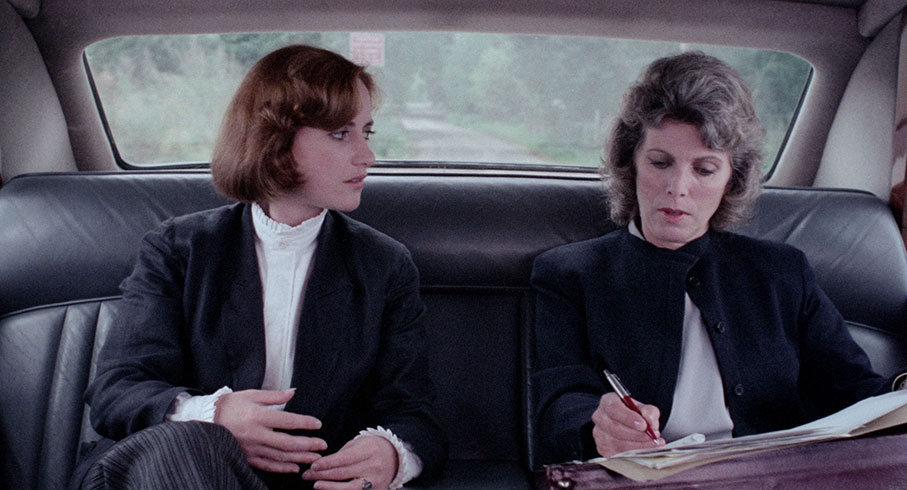
On returning to the office after attending Pryde’s funeral, Cordelia finds Elizabeth Leaming (Billie Whitelaw) waiting to speak to her former partner about the case he was due to investigate for her wealthy employer, James Calendar (Paul Freeman). When Cordelia reveals that Pryde is now dead, the coldly unfriendly Elizabeth departs, but the suddenly motivated Cordelia sprints after her and convinces her that she is capable of handling the case in her former partner’s place. When she meets Calendar, he reveals that his son Mark has recently committed suicide, and that he has hired her to find out why he took his life. In the course of her investigations, Cordelia moves into the cottage in which the fateful event occurred, and finds herself increasingly fascinated by Mark, to the point where it starts hindering her ability to carry out the task with which she has been charged.
An Unsuitable Job For a Woman was adapted from the novel by P.D. James by Elizabeth McKay, Brian Scobie and former Time Out critic Christopher Petit, who here was making his second film as director following the international critical success of his debut feature, Radio On. I’d somehow missed that earlier film on its first run, despite being intrigued by the publicity stills and some very positive reviews, so when, on 11 August 1982, it was programmed on a double-bill with Petit’s newly released second feature at my favourite London independent cinema, The Scala, I jumped on a train and headed to the capital.

I was really taken with Radio On, but I’ve dealt with my reaction to that in my review of the BFI DVD release here. An Unsuitable Job for a Woman struck me as a very different film, but I distinctly remember enjoying it and being seriously wound up by two scenes in particular, one of which I had a rather different response to all these years later. I’ll get to that. I do remember being a little surprised that Petit would choose to follow a monochrome Wim Wenders-influenced road movie, with a film that on paper was a more commercially minded work. That said, it was neither a critical nor a financial success, with one of its principal backers, Goldcrest Films, making a £120,000 loss on its £316,000 investment. As is often the way, I failed to catch the film a second time, and it instead remained little more than a positive memory, a little overshadowed by its predecessor, at least until Indicator’s review disc turned up at my door. I found myself oddly apprehensive about watching it again after so long, as my own tastes have changed in the intervening years, and not everything I enjoyed in my early twenties now hits the right notes for the increasingly cranky old fool I’ve grown into. A little research on the film also threw up some surprisingly hostile responses, through rarely from anyone whose views I give a hoot about. Nevertheless, I began to wonder perhaps the younger me had simply been easier to please.
Coming back to An Unsuitable Job for a Woman after such a long break, it feels much more recognisable as the work of the man who made Radio On than I seem to recall. The first thing to note, and I’m guessing this is one of the things that got up the naysayers’ noses, is that the mystery at its centre, the one that Cordelia has been hired to investigate, is not the prime focus of the narrative. At almost every step, it feels secondary to Cordelia’s increasing fascination with Mark, or at least the picture of him that her enquiries have painted for her. Each stage of her investigation seems to open a door into another aspect of this young man’s life that triggers an empathic or sympathetic response on her part, creating in her an almost uncontrollable desire to understand him on more than a superficial level, and to get to the truth of who he really was and what happened to him. Just how much of her growing obsession is rooted in the recent loss of her business partner and friend, also to unexplained suicide (more clarification is provided in the novel), is just one of many teasingly unanswered questions here.
Cordelia’s growing fascination with Mark on every level hits a dangerous peak in the first of the film’s two showpiece scenes. It begins when case officer Sergeant Maskell (David Horovitch) visits the cottage, seemingly to dissuade Cordelia from further investigating a case that has already been closed. He uses the leather belt with which Mark hung himself to add weight to his words, and when Cordelia asks if she can keep it, he unexpectedly obliges. For Cordelia, the object itself seems to offer an almost metaphysical connection to Mark, one she attempts to strengthen by looping the belt round her own neck and tightening it. Then, in a misguided attempt to feel something of what he felt in his final moments, she stands on a chair and ties the other end of the belt around the same ceiling hook from which Mark was found hanging. Inevitably, the chair slips and Cordelia is left fighting for her life, desperately grasping at the hook and struggling to prevent her seemingly inevitable strangulation. As a sequence, playing out as it does in discomforting silence (and, Petit reveals in the special features, with Pippa Guard doing the whole thing for real), it’s a hell of a wind-up, but watching it this time around it proved a very different experience for this particular viewer. Back when I first saw the film, I had a close friend who has since passed away, and this is exactly how he died. Even all these years after his death so shook me, watching this scene sent dark shivers trampling down my spine.
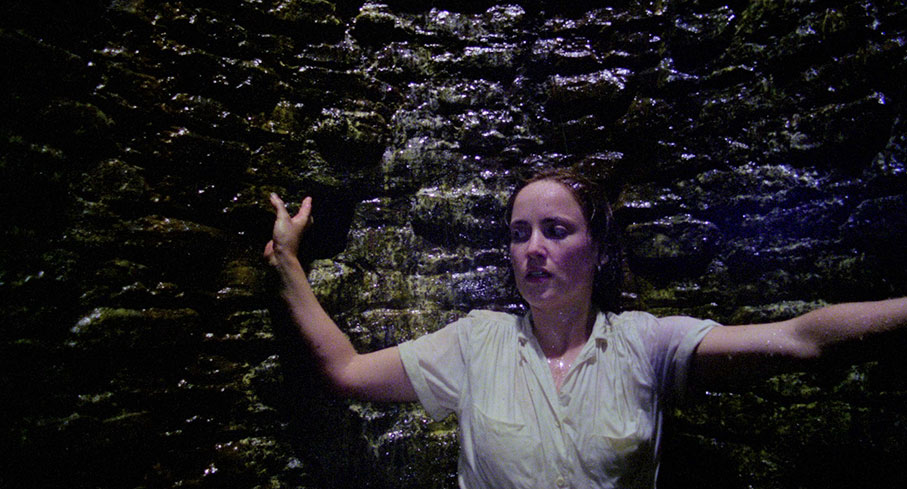
The second showpiece scene, and the one that really stayed with me, comes after a briefly glimpsed figure grabs Cordelia in the cottage and throws her down a deep well in the garden, and she has to try to effect an escape by edging her way up towards a set of rickety ladder rungs, her back pressed against one wall and her feet against the other. The tension generated by this sequence had me gnawing at my fingernails on my first viewing and saluting Petit’s pitch-perfect direction the second time around. Guard is at her best here, really selling Cordelia’s blend of fear, desperation and grim determination, and it took a second viewing for me to register that the belt that nearly took Cordelia’s life in that earlier scene was now to prove the instrument of her salvation.
Some will disagree, but for me, the casting and performances all hit the right note for what is in some ways is less of a detective story than a meditation on one. As the wealthy James Calendar, Paul Freeman – who just a year earlier had reached an international audience as Indiana Jones’s principal rival René Belloq in Steven Spielberg’s Raiders of the Lost Ark – has the look, body language and clipped delivery of a man who is burying his grief behind a wall of business bluff. As his live-in personal assistant, Elizabeth Leaming, Billie Whitelaw is a model of cold distrust, unconvinced of Cordelia’s worthiness as a detective and seemingly knowing more about the case than she is willing to admit. Supporting roles are played with a calculated degree of reserve by Dawn Archibald and Dominic Guard (cousin of Pippa) as Mark’s waif-like former flatmate Isobel and his childhood friend Andrew Lunn, who now works as Calendar’s business associate. And then, there’s Pippa Guard, who makes for an intriguingly unusual detective, initially looking too physically frail and too unsure of herself to fit the commonly held view of what a private investigator should be. Yet it’s that very quality that I suspect might give her an edge as an investigator, given that a prime quality for any decent private detective would be to seem invisible, to not stand out or attract suspicion. The film also has a distinctive look – one that this transfer on this Blu-ray really brings out and flatters – thanks to Radio On cinematographer Martin Schäfer, whose subtly attractive lighting camerawork is enhanced by the use of Agfa film stock, whose colour hues differ from those of the Eastmancolor stock favoured by British films of the day and give the film a distant, almost dreamy quality.
I’ve seen it argued that the film fails to get beneath the surface of Cordelia’s growing obsession with the person she is coming to believe that Mark was, or the sensual nature of her attraction to him, and that loose ends aplenty are left dangling, and I fully accept that. I have to admit that until I listened to the interviews on this disc, I was unaware of the behind-the-scenes problems or the compromises that Petit was forced to make, and knowledge of this helps to explain a sequence involving a car chase that climaxes in a crash that takes place off-screen, usually a sure sign of budget or production issues. What it doesn’t make clear is why the driver of the fated car, who loses control because he’s blinded by the lights of the pursuing vehicle, didn’t just make a quick adjustment to the rear-view mirror that is reflecting the light directly into his eyes instead of repeatedly glancing at it and squinting at the brightness until he loses control.
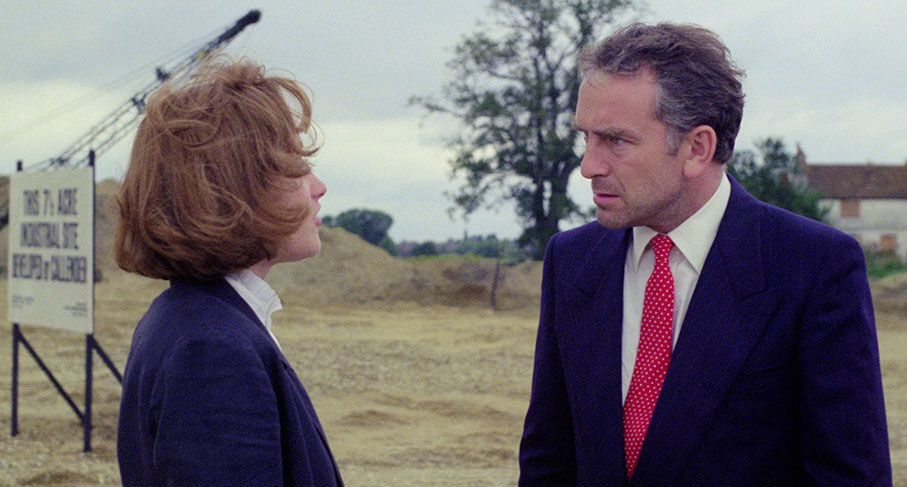
But these are relatively minor blips in a work that I was pleased to find myself still rather entranced by. I accept that others will not feel the same, and that fans of the novel – which is considerably pared down here – and detective story devotees in general may be frustrated by the focus on Cordelia’s fascination with the subject of her investigation instead of the mystery. For me, the film’s offbeat approach and tone, its painterly use of colour, its low-key performances, its two showpiece tension sequences, and the moodily effective score by former Ian Drury and the Blockheads guitarist and keyboardist Chaz Jankel, still make for quietly seductive viewing. It doesn’t quite have the purity of vision that made Radio On such an arresting debut, but I was still rather pleased to discover that it lived up to my positive memories of that long-ago Scala screening, and no other British film of the period quite captured its engagingly offbeat feel.
The film was restored by Powerhouse Films at Final Frame Post in London, with the original 35mm camera negative scanned at 4K, and restoration work undertaken at 2K to remove dirt and unstable frames. The resulting transfer, framed in the original aspect ratio of 1.85:1, is handsomely presented here, with the distinctive colour hues of the Agfa stock very nicely captured, the contrast well balanced, and the detail cleanly and often crisply rendered. What I particularly appreciate is its unmistakably film-like feel – I’ve yet to see a digitally shot feature that displays the same texture.
The Linear PCM 1.0 mono soundtrack was remastered from the original 35mm optical soundtrack element and does the job nicely. There are some minor range restrictions, but the dialogue is always clear, and Chaz Jankel’s score has a pleasing level of breadth and depth.
Optional English subtitles for the deaf and hearing impaired have been included.
Christopher Petit: Mise-en-scène of the Crime (29:36)
A most welcome new interview with director and co-writer Christopher Petit, who outlines in revealing detail how the project came to be and what attracted him to it, then gets into the problems that arose during the production and how the changes enforced on him by others impacted his original vision for the film. He talks about casting the lead character of Cordelia Gray, his insistence on having Martin Schäfer as his director of photography and the union issues this raised, writing a darker toned draft of the screenplay that had to be discarded when Billie Whitelaw threatened to walk if that version was filmed, and the difficulties that arose when they came to shoot the sequence in which a car plunges into a river. Despite these compromises, revisiting the film proved a pleasant surprise for him, and he confirms that 85% of what he wanted is up there on screen. I was also amused to hear him unexpectedly claim that had he been 20 years older, he would have been happy to have a career directing Hammer horror movies. That I could never have predicted.
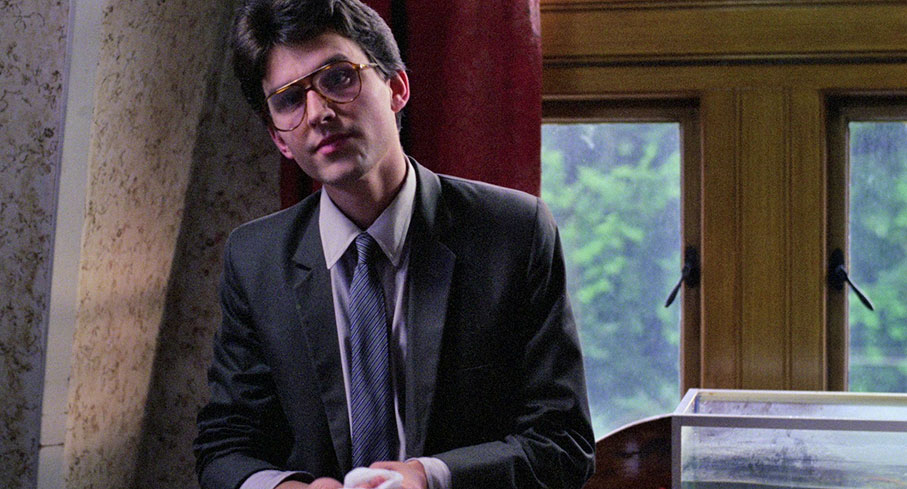
Dominic Guard: A Bridge Too Far (12:47)
A brief chat with actor Dominic Guard, who recalls getting the role of Andrew Lunn primarily because Christopher Petit’s mother thought he was very good as Colin Gilbert in the TV series Maybury. He reveals that Sting was miffed that he was too busy with his music to take a role that was originally earmarked for him, and that Petit’s decision to the actors find their way around a scene in their own time didn’t impress the money people. He also recalls filming a shot that traumatised him for years (to reveal more would be a serious spoiler) but that didn’t make it into the finished film.
Don Boyd: Absolute Fascination (31:12)
Every bit as engaging and educational as the interview with Christopher Petit is this chat with the film’s executive producer, Don Boyd, who provides an alternative perspective on how the production came together and progressed, as well as the nature of the problems that later arose. Subjects covered include securing the rights to the book and the central character with an eye on possible spin-offs, the involvement of Goldcrest Films in the funding, smoothing over a breakdown of trust between Petit and the crew that nearly saw Petit leave the production, the problems the film faced after its completion, and more. He recalls a receptive screening at the Berlin Film Festival and the more negative critical response, but reveals that P.D. James really liked it, which is as good a seal of approval as you could hope for.
Theatrical Trailer (2:59)
A so-so stab at an atmospheric sell, but there are even more spoilers here than in my review. Save this one for after the film.
VHS Trailer (4:30)
Bloody hell, enough with the spoilers already! A more persuasive sell than the above, but again, best saved for after you’ve seen the film.
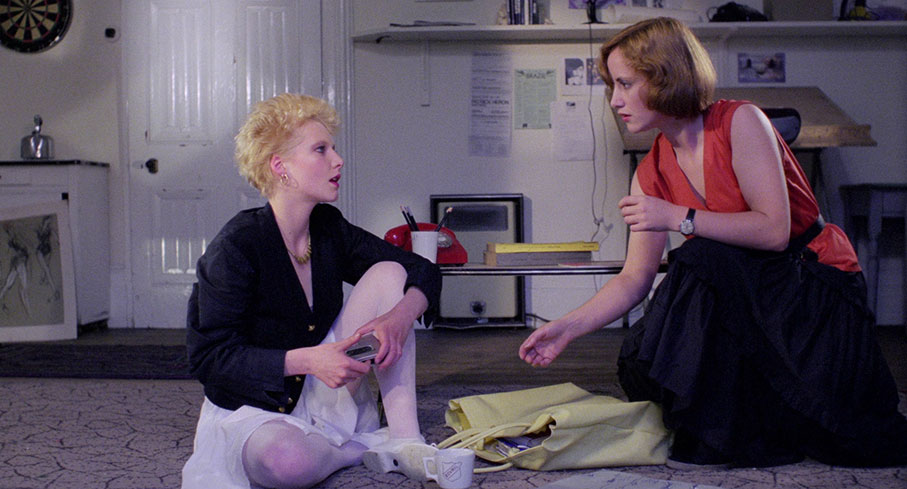
There are two Image Galleries. Promotional Material features 27 screens of production photos, press release pages, VHS video covers, and posters. Unit Photography has a whopping 112 screens of on-set and location photos, including a fair few behind-the-scenes shots.
Booklet
The lead essay here is by Professor of Film and Film Culture at De Montfort University, Claire Monk, and it examines the film from a modern perspective and is peppered with perceptive observations and readings. It’s also sometimes nicely evocative in its use of language – I particularly liked the description of Petit’s Radio On as “Germanically British.” Following this is a reproduction of a piece written by Christopher Petit written for the June 1982 edition of Monthly Film Bulletin, in which he writes about adapting the P.D. James source novel and how it relates to other crime fiction subgenres. Up next is an article written for Sight and Sound by John Pym, who visited the set and writes about the making of the film, and includes quotes from Petit about the production, and details of the cast and the use of Agfa film stock. Rounding things off are extracts from three of the more positive contemporary British reviews. As ever, full credits for the film have been included and the booklet is illustrated with promotional material and photos.
Another one of those films from my younger days that I remain fond of but that I suspect will be scornfully dismissed by others, An Unsuitable Job for a Woman remains an intriguing and intermittently gripping work from a critic turned filmmaker whose distinctive first feature was always going to be a task-and-a-half to follow. It’s the very sort of title that I’m delighted to see an independent label like Indicator restoring and releasing on Blu-ray, and as ever, they’ve done a spanking job, with a strong transfer and well-targeted and informative special features. Recommended.
|